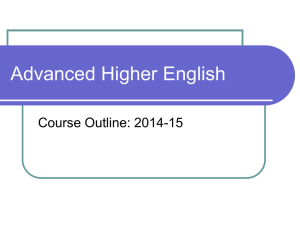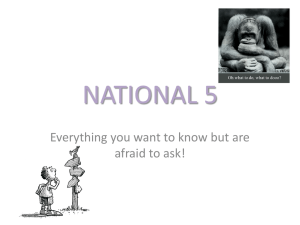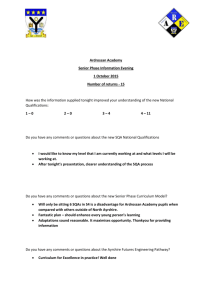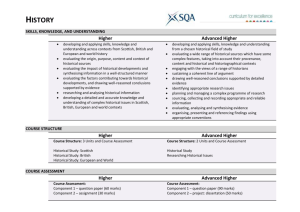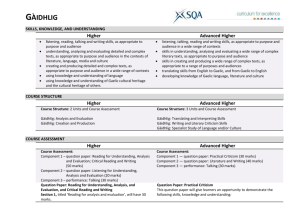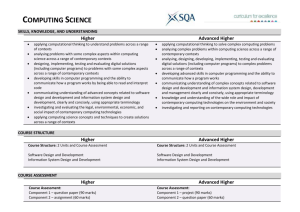National 4
advertisement
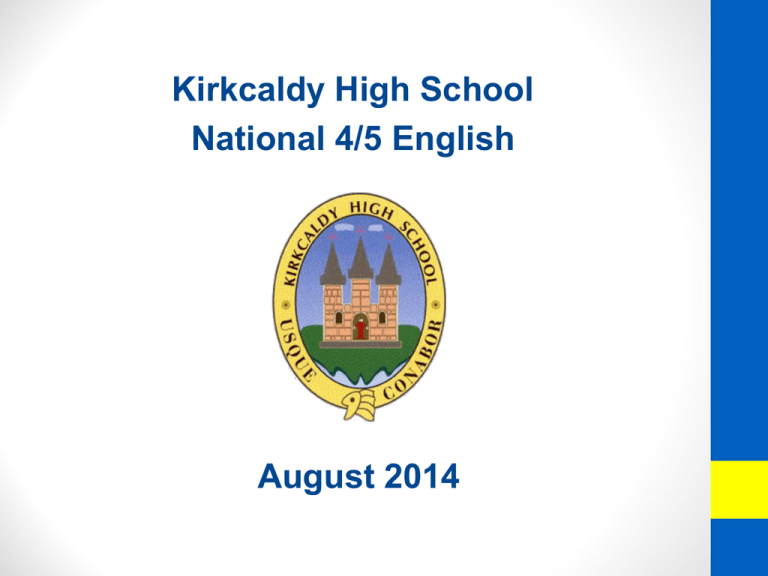
Kirkcaldy High School National 4/5 English August 2014 Relationship between the Courses and Curriculum for Excellence Values, Purposes and Principles • Language and literacy are of personal, social and economic importance. • Learners’ ability to use language lies at the centre of the development and expression of their emotions, thinking, learning and sense of personal identity. • The Course provides learners with the opportunity to develop skills in listening, talking, reading and writing, which are essential for learning, life and work. • Building on the four capacities, the Course enables learners to communicate, be critical thinkers, develop cultural awareness and be creative. Learners develop an appreciation of Scotland’s literary and linguistic heritage. Purpose and Aims of the Courses The Course aims to enable learners to develop the ability to: • listen, talk, read and write, as appropriate to purpose, audience and context • understand, analyse and evaluate texts, including Scottish texts, as appropriate to purpose and audience in the contexts of literature, language and media • create and produce texts, as appropriate to purpose, audience and context • apply knowledge and understanding of language National 4: The Course There are 4 mandatory units: English: Analysis and Evaluation (National 4) Listening and reading skills in the contexts of literature, language and media. Learners develop the skills needed to understand, analyse and evaluate straightforward texts. English: Creation and Production (National 4) Talking and writing skills in familiar contexts. Literacy (National 4) Develops the learners’ reading, writing, listening and talking skills in a variety of forms relevant for learning, life and work. Added Value Unit: English Assignment (National 4) Provides learners with the opportunity to apply their language skills to investigate and report on a chosen topic. This assignment will allow the learner to demonstrate challenge and application. National 4 Assessment • There is no exam for National 4 English. • All units are marked on a pass / fail basis internally. • The SQA will verify pupils’ work to ensure that assessments meet the national standards. National 5: The Course There are 2 mandatory units: English: Analysis and Evaluation (National 5) • Listening and reading skills are developed in the contexts of literature, language and media. Learners develop the skills needed to understand, analyse and evaluate detailed texts. English: Creation and Production (National 5) • Talking and writing skills are developed in a range of contexts. Assessment of Units • Both units are assessed internally on a pass/fail basis. • Candidates must pass internal assessments before they can proceed to the external examination. • The first formal assessment will be in reading and will take place in class in December. • Pupils will be given notice of this and should be practising at home in preparation. National 5: Added Value In National 5 English, the course assessment is the ‘Added Value’. The Course assessment will take the form of: • a portfolio through which learners will demonstrate their writing skills (30 marks) • a question paper through which learners will demonstrate their reading skills (70 marks). • Learners will answer at least one question on a Scottish text. National 5: The Portfolio Pupils must produce 2 folio essays to be submitted to SQA for marking: • 1 x Creative Essay (Personal / Imaginative) • 1 x Discursive Essay (Discursive / Persuasive) • These will be sent to the SQA in March and will, therefore, have to be submitted in February. Pupils should be working on these throughout the year. • There is a Folio Workshop running weekly where pupils can access computers, and English teachers are available for support. National 5: The Exam • Paper 1: Reading for Understanding, Analysis and Evaluation (1 hour) Consists of one non-fiction passage, and questions worth 30 marks. • Paper 2: Critical Reading (1.5 hours) Consists of a Scottish Text paper (20 marks) and a Critical Essay Paper (20 marks). National 5: Homework As a minimum, pupils should be working on the following at home: Term 1 • Discursive Writing: research, planning and first draft Term 2 • Discursive Writing: redraft • Creative Writing (Imaginative/ Personal): first draft Term 3 • Prelim Revision • Finalising Folio National 5: The Prelim • January • Full Exam ( 2 papers) • Paper 1: Reading for Understanding, Analysis and Evaluation (1 hour) • Paper 2: Critical Reading (1.5 hours) Revising for the Prelim Reading for Understanding, Analysis and Evaluation (Close Reading) • Revise common question types and how to answer them (understanding, summarising, word choice, imagery, structure, effective conclusions…) • Revise techniques such as: simile, metaphor, personification, punctuation marks, features of structure. Candidates must be able to comment on the effect of these techniques. • Complete specimen papers (under timed conditions). • Read quality non-fiction regularly. Revising for the Prelim Critical Reading Scottish Text • Revise the poems of Carol Ann Duffy or The Sailmaker. Pupils should be aware of key ideas, theme, language, structure, form, imagery, character, setting… Critical Essay • Revise the prose text(s) studied in term 1. • Revise Critical Essay structure. • Practise timed Critical Essays, remembering to adapt them to meet the needs of the question. Key Differences From S’Grade • Exam focus on Reading, with all Writing marks coming from the folio • Introduction of Scottish Text paper • Critical Essay writing in the exam • Talk does not contribute to final mark • More of final mark depends on exam performance • Pace and challenge • Better preparation for Higher English than Standard Grade The story so far… Useful Links • • • • http://www.sqa.org.uk/sqa/59033.html http://www.sqa.org.uk/sqa/47410.html http://www.sqa.org.uk/sqa/47403.html https://blogs.glowscotland.org.uk/glowblogs/NPF/files/2013/ 03/nutshell_english_N5_E.pdf Revision • http://www.bbc.co.uk/education/guides/zk4hvcw/revision
